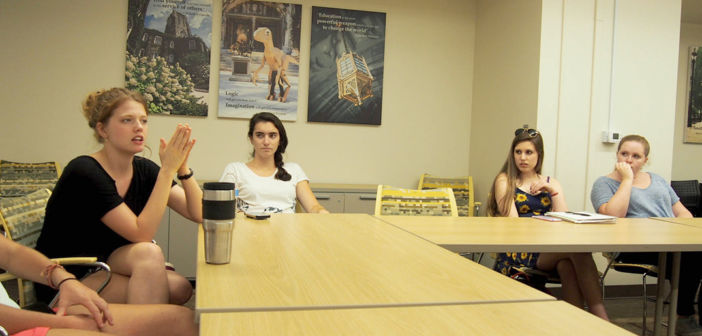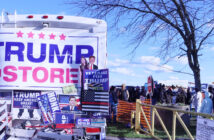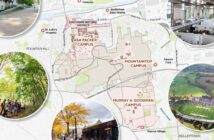In the fall of 2004, Michael Moore visited Lehigh as part of the “Slacker Uprising Tour” to colleges in swing states, aiming to encourage people to vote in that year’s presidential election.
The event was supposed to be non-partisan, Lehigh’s general counsel Frank Roth said during a Sept. 20 meeting. Moore was supposed to promote voting, but not who to vote for. However, in the last moments of his presentation, Moore told the audience to vote for John Kerry, the Democratic candidate. In doing so, Roth said Moore violated multiple university policies.
Lehigh is a nonprofit institution of higher education, a designation that allows the school to enjoy tax-exempt status. In order to maintain this, however, Lehigh must comply with Section 501(c)(3) of the Internal Revenue Code, which states the university is prohibited from “(participating) in, or (intervening) in (including the publishing or distributing of statements), any political campaign on behalf of (or in opposition to) any candidate for public office.”
After the Moore incident, Roth revisited the guidelines to be followed on Lehigh’s campus. These guidelines are outlined in a document entitled the Guide for Ensuring Compliance with Lehigh’s Tax Exempt Status during Political Campaigns.
This year, Americans will elect their 44th president. During election years such as this, Lehigh’s compliance guide is particularly significant.
The guide includes rules pertaining to political fundraising on campus, event registration and event compliance with university timelines.
One of the rules is events that claim to be student supported must, in fact, be student supported. Roth said this means organizations must be verified by the president or officers of a club, and the programming must be run, at least in part, by the students, rather than completely run and organized by the campaign group.
Candidates who visit campus must adhere to the capacity in which they were invited to campus. According to the guidelines, candidates who are invited to campus in their capacity as a candidate may speak about their campaign, but the university has to also offer the candidate’s opponent(s) an equal opportunity to visit campus for a comparable event.
Jigar Patel, ’17, the president of College Democrats, was planning an event to bring surrogates for national and local candidates to speak on campus.
“I have to postpone the event because they’re not represented equally,” Patel said.
Although surrogates from one national campaign agreed to speak at Lehigh, the other campaign never responded to messages, he said.
“Legally we’re not able to do it because they’re not being represented equally and they don’t have the ability to hold a similar event,” Patel said.
Candidates invited to campus not in their capacity as a candidate may not speak about their candidacy.
The guidelines state, “Neither the candidate, the university group that invited the candidate, nor any advertisements publicizing the candidate’s visit should mention the individual’s candidacy or the upcoming election.”
Roth said this has actually happened twice on Lehigh’s campus.
In 2006, governor Ed Rendell came to Lehigh to speak about his experience as governor of Pennsylvania. Although Rendell was running for re-election at the time, he was not allowed to campaign or mention his candidacy.
In 2008, Madeleine Albright visited Lehigh to speak about her work as secretary of state. At the time, Albright was campaigning for Hillary Clinton, a democratic nominee for president. However, because Albright was invited to Lehigh to speak specifically about her previous experiences, she was not allowed to campaign for Clinton while at the university.
Political programming on campus must also adhere to the guidelines.
On Monday, the political science and international relations departments held a discussion and panel before the presidential debates.
“The election panel is not a political event — it is an analytical event,” said Dinissa Duvanova, an international relations professor who will be participating in the panel.
It is all about the context, said Matthew Kitchie, the director of student activities. Events that are educational and curricular are more likely to be deemed acceptable.
Roth said students and faculty members have a certain degree of academic freedom on campus, which allows them to voice political opinions as private citizens.
“I consider any type of political propaganda completely unprofessional and I haven’t seen any of my colleagues using the classroom as a platform to promote specific political views or programs,” Duvanova said.
Even with faculty members sharing their opinions, context and consultation are key, said William Dewalt, the assistant general counsel, in a Sept. 20 meeting. Professors cannot create the impression they are speaking for the university. While promoting political discourse is allowed, Roth said, indoctrinating the ideas of a candidate is not.
Patel likes to hear the opinions of his professors, as long as they explain their reasoning.
“I think that is great when they do, because sometimes they have to hide it,” Patel said. “I think professors understand where that fine line for them is.”
Students and faculty may express their opinions on campus, but the legality becomes much more difficult with staff members and administration. Although it’s contextual, and can change depending on the situation, the president of a university typically cannot voice his or her support because of their prominence and relationship as representatives of the school, Roth said.
“Think of it as a spectrum and where you land on that spectrum,” Roth said. “There are definitely shades of gray.”
Voter registration activists are another gray area in terms of legality. If the groups reserve space on campus, they need to pay market value, Roth said. They should also be supported by a student group on campus.
However, Kitchie said it is hard to police every single square foot of campus.
Although Patel has been in contact with the groups working to register students to vote, his club is not affiliated with them. Patel said, many of those registering voters are Lehigh students with fellowships with the Pennsylvania democratic party, but they are behaving as non-partisan entities.
The Brown and White reached out to a student representative for the Pennsylvania Democratic Party, but was told fellows are unable to speak to the press.






Comment policy
Comments posted to The Brown and White website are reviewed by a moderator before being approved. Incendiary speech or harassing language, including comments targeted at individuals, may be deemed unacceptable and not published. Spam and other soliciting will also be declined.
The Brown and White also reserves the right to not publish entirely anonymous comments.